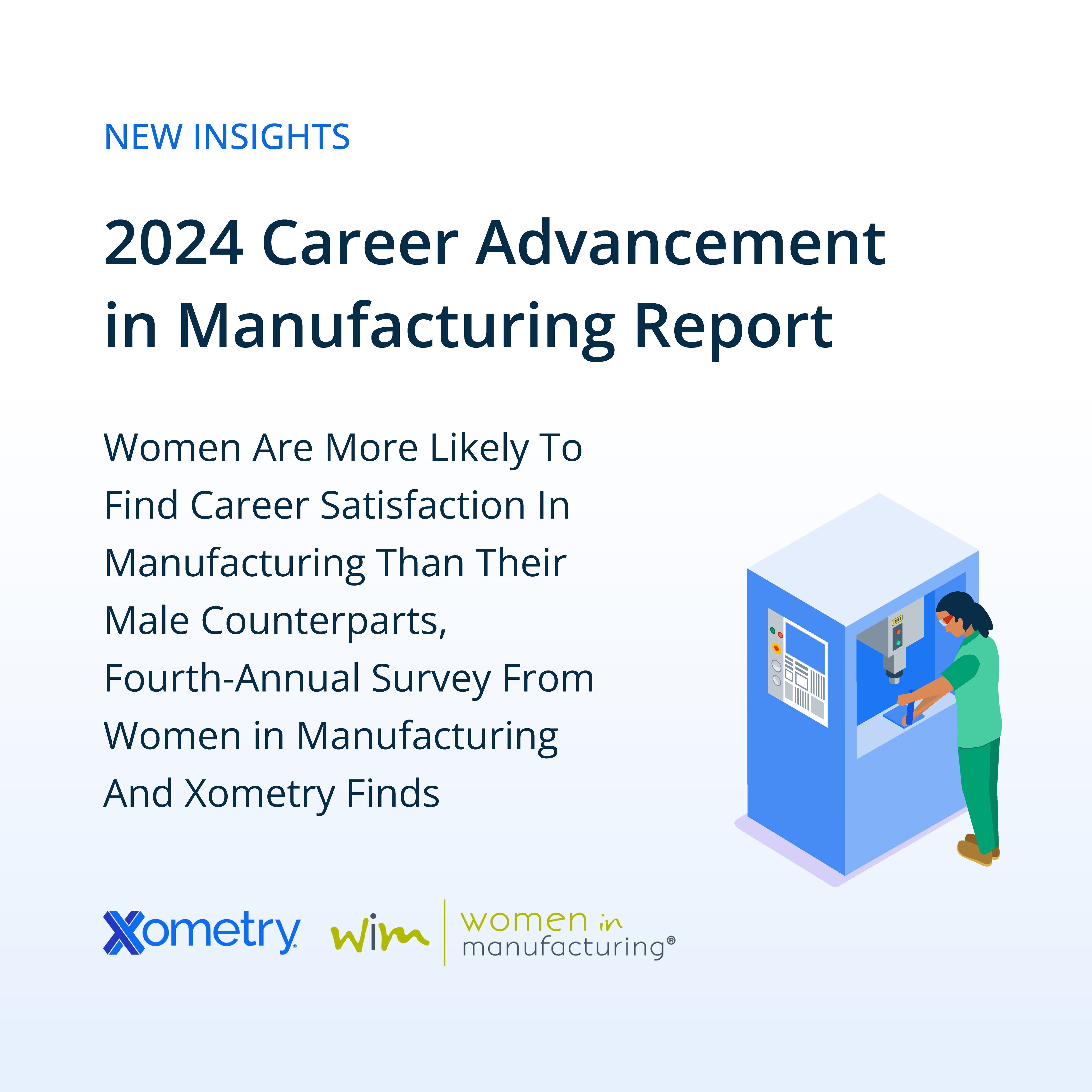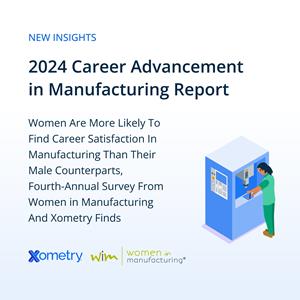-
Women Are More Likely To Find Career Satisfaction In Manufacturing Than Their Male Counterparts, Fourth-Annual Survey From Women in Manufacturing And Xometry Finds
来源: Nasdaq GlobeNewswire / 21 2月 2024 08:04:00 America/New_York
- Nearly 80% of Women Are Pleased With The Strides They’ve Made In Manufacturing, Up From 62% In 2020
- More Than 80% Of Women Recommend a Career In Manufacturing
- The Overwhelming Majority Of Men And Women Believe Diversity In Manufacturing Improves Business Outcomes
NEW YORK and NORTH BETHESDA, Md., Feb. 21, 2024 (GLOBE NEWSWIRE) -- An overwhelming majority (79%) of women say they are satisfied with the progress they’ve made in the manufacturing industry over the last five years, up significantly from 62% in 2020, according to the fourth-annual ‘Career Advancement for Manufacturing Report,’ produced in partnership between Xometry and Women in Manufacturing Association (WiM). The survey also revealed that women are more likely than their male counterparts to recommend a career in manufacturing (80% to 74%).
More than two-thirds of women (71%) said they did not intentionally choose manufacturing as their field of choice, but once in, recognize how their contributions are propelling industry forward. The overwhelming majority of women (90%) and men (67%) believe that diversity improves business outcomes.

“The results of this year’s survey confirm what many of us have felt for a long time: that women can find fulfillment and achieve success in manufacturing,” said Kathy Mayerhofer, Xometry’s Chief Sales Officer. “Yet we have to do more to reach women at increasingly younger ages, compel them to pursue STEM educations, and market the incredible entrepreneurial opportunities that exist within manufacturing. For women in manufacturing, the sky's the limit.”
“We firmly believe in the transformative power of women to drive the manufacturing industry forward,” said Allison Grealis, President and Founder of WiM. “This survey continues to validate the notion that women play a pivotal role in the industry and it is imperative to redouble our efforts in attracting and engaging more women in manufacturing to foster enduring change and fortify the industry's resilience.”
“I have a birds-eye view into the hiring trends in manufacturing, and the two biggest concerns I see are the lack of a skilled workforce and the continued lack of diversity,” said Sophia MacDonald, Xometry’s Chief People Officer. “As manufacturing continues morphing into a high-tech industry, the industry has opened a world of opportunities for women at all levels – and it’s up to all of us to evangelize those opportunities and support women in their professional journeys.”
Among other key highlights of the survey:- Eighty-three percent of companies continue to experience significant labor shortages, with industrial mechanics, maintenance technicians and engineers among the hardest roles to fill.
- Most women report entering manufacturing through job postings, co-op programs, and recruitment, whereas most men join the industry through family businesses, apprenticeships or internships, and STEM programs.
- The Medical/Healthcare (25%), Environmental (24%), and Telecommunications (24%) sectors have the highest percentage of female leadership in manufacturing.
- Telecommunications (35%), Transportation (32%), and Environmental (32%) industrial companies have the highest percentages of female employees.
Methodology
Xometry’s Thomas division, a leader in product sourcing, supplier selection, and marketing solutions for industry, partnered for a fourth year with Women in Manufacturing Association (WiM) on the annual survey. The study was conducted online using Qualtrics over a 26-day period from January 3 to January 29, 2023. The research surveyed nearly 1,000 North American suppliers and industry professionals who work at companies with revenues spanning from less than $1 million to more than $1 billion.Click here for a copy of the Career Advancement for Women in Manufacturing Annual Report.
About Xometry
Xometry’s (NASDAQ:XMTR) AI-powered marketplace, popular Thomasnet® industrial sourcing platform and suite of cloud-based services are rapidly digitizing the $2.4 trillion manufacturing industry. Xometry provides manufacturers the critical resources they need to grow their business and makes it easy for buyers to create locally resilient supply chains. The Xometry Instant Quoting Engine® leverages millions of pieces of data to analyze complex parts in real-time, matches buyers with the right suppliers globally, and provides accurate pricing and lead times. Learn more at www.xometry.com or follow @xometry.About WiM
The Women in Manufacturing® Association is a more than 24,000-member-strong association dedicated to supporting, promoting and inspiring women who have chosen a career in the manufacturing industry. It encourages the engagement of women who want to share perspectives, gain cutting-edge manufacturing information, improve leadership and communication skills, participate in sponsoring programs and network with industry peers.Media Contacts
Illume PR for Xometry
xometry@illumepr.comSusan Hunter-Vazinski
Women in Manufacturing
svazinski@womeninmfg.orgMatthew Hutchison
Matthew.Hutchison@xometry.comA photo accompanying this announcement is available at https://www.globenewswire.com/NewsRoom/AttachmentNg/af41a29f-37a4-4a28-aaa0-c6f79e4b628a

Women Are More Likely To Find Career Satisfaction In Manufacturing Than Their Male Counterparts, Fourth-Annual Survey From Women in Manufacturing And Xometry Finds
An overwhelming majority (79%) of women say they are satisfied with the progress they’ve made in the manufacturing industry over the last five years, up significantly from 62% in 2020, according to the fourth-annual ‘Career Advancement for Manufacturing Report,’ produced in partnership between Xometry and Women in Manufacturing Association (WiM). The survey also revealed that women are more likely than their male counterparts to recommend a career in manufacturing (80% to 74%).
- Nearly 80% of Women Are Pleased With The Strides They’ve Made In Manufacturing, Up From 62% In 2020
